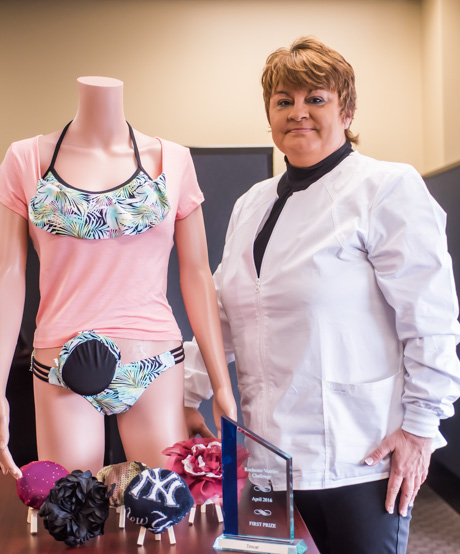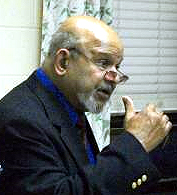Besides a potentially great idea, Georgann Carrubba has one of the key things investors look for in a startup CEO -- passion for an idea that she thinks will make a big change in people's lives.
Though the product she hopes to bring to market is decidedly less sexy than some tech gadget, she thinks her sincerity is what swung a panel of judges in her direction two days ago when they awarded her the $25,000 top prize in the 2016 Rochester Venture Challenge.
The lifelong Batavia resident said she could hardly believe she won, standing on stage in front of 300 people with young men who came to pitch ideas for drones, mobile phones and gaming.
She had been through this kind of competition before, at Buffalo's 43 North, where tech inventions carried the day.
"I was in complete shock," Carrubba said. "I'm looking at each side of me and it's all technology again. And they're good people and they believe in their products as much as I do, so I was completely caught off my game. When they asked me to speak, I cried. I had to compose myself to say a couple of sentences because I truly did not think we would win. It was a tough competition."
Not only is Carrubba's product less sexy than a tech gadget, it addresses an issue that doesn't even get a lot of attention among the pantheon of people's medical issues that are the subject of telethons, ribbon wearing and 5K races.
We're talking about colostomy and ileostomy patients, people who have bags attached to a hole in their abdomen to collect their bodies' waste.
There are some 800,000 ostomy patients in the United States (perhaps as many as 5 million worldwide), and another 50,000 to 65,000 are given the procedure each year. The surgeries are the results of cancer, disease or accidents and the range of ages includes the very young and the very old.
Up until now, these patients have been saddled with a bulky bag that is prone to leaks and odor and reduced mobility and activity, including sexual activity.
Carrubba became a visiting nurse in 2004 and dealt with many patients who struggled with their ostomy equipment and dealt with the embarrassment of their situation often by avoiding socializing and outside activities.
She thought in this day and age, why hasn't something better come along?
There had been no significant advance in ostomy care in 60 years.
One evening in 2011, she was sipping coffee at her sister's house and glanced down at a bowl and an idea popped into her head.
"I went home, went to bed, said my prayers and the next day made it in my garage," Carrubba said.
What Carrubba invented -- and secured a patent on -- is a cup-like device that attaches to the diaphragm in the patient's abdominal opening and collects waste. It is secure, airtight and waterproof.
She has a patent pending on a sensor that will be included in the cup so patients will be alerted on an iPhone or iPad when the bag inside the cup needs to be changed.
To go along with the device, called a Choice Cap, patients will be able to purchase biodegradable bags, and perhaps eventually, bags that can be flushed down any toilet, and decorative covers that can match anything from a wedding dress to swimsuit to boxers or a slinky nightgown.
After six design changes in the prototype, Carrubba is ready for the Choice Cap to go through trials with actual patients. Even though the product doesn't require FDA approval, she wants that kind of rigor in the trials so she and her team can collect the feedback and make any design changes needed before going into production.
She hopes to have the Choice Cap on the market by early 2017.
A journey that began with a spark of inspiration hasn't necessarily been easy or straightforward. Carrubba has never run a business and didn't really know the first thing about starting a business.
She got together with her cousin, Eugene Tenney, an attorney in Buffalo, to help form a company, originally to be called Carten, but it turned out that name wasn't available, so it became Tencar, a company she plans to keep based in Batavia.
She then went to the Innovation Center at the Med-Tech Center, where the Genesee County Economic Development Center staff helped her form an advisory board, provided information and introductions for the startup communities and services in Buffalo and Rochester.
The competitions taught her a lot about the business world, she said, but admits that while she'll remain CEO, she really isn't qualified to be COO or CTO or CFO or any of the other C-suite positions.
She was particularly grateful to High-Tech Rochester for the training and mentoring program that preceded the competition, and she said the encouragement she received from Theresa Mezzullo and Rami Katz of the investment firm Excell Partners was particularly helpful.
It was Katz who advised Carrubba to just be herself during the pitch, so she showed up in her nurses scrubs and spoke from her heart.
What drivers Carrubba, she said, isn't the allure of entrepreneurial success, or even the potential $2.4 billion domestic market for her product, but the hope of making people's lives better.
"I was never one of those, 'I'm going to invent something and be a millionaire,' " Carrubba said. "No, no, no. I was a nurse. I've always been a nurse. Truth be known, probably a lot of my employers don't like me because I've always been on the side of the patient, whatever is best for the patient. I've always been a patient advocate."


